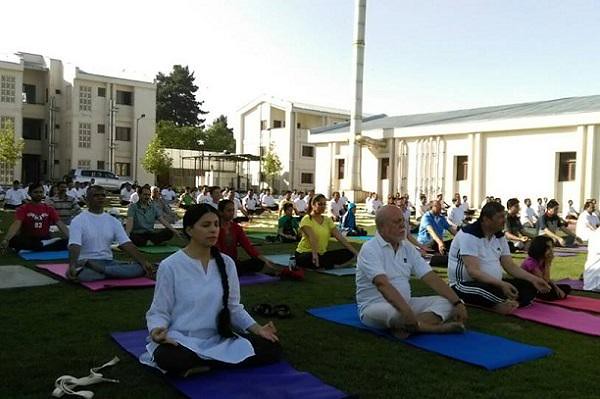By Chaitanya Mallapur
New Delhi, June 21 (IANS/IndiaSpend) There are 47 Islamic nations among the 177 countries of the United Nations General Assembly (UNGA) that officially co-sponsored with India a resolution to establish June 21 as “International Day of Yoga”.

Yoga session on the occasion of International Yoga Day at the premise of the Indian Embassy in Kabul.
Yoga is a 5,000-year-old physical, mental and spiritual practice rooted in Hindu tradition, a religious origin that has caused disquiet among some Indian Muslim clerics.
This is the highest number of co-sponsors ever for any UN General Assembly resolution, according to the Ministry of External Affairs (MEA). The resolution was passed unopposed without a vote.
Prime Minister Narendra Modi has promoted yoga as a means to project India’s soft power. Some critics accuse him of subtly furthering a Hindu agenda, while some representatives of Indian Islamic organisations support Yoga Day, saying that namaz includes yogic postures.
Afghanistan, Bangladesh, Turkey, Iran, Indonesia, the UAE, Qatar and Oman were among the Islamic nations that co-sponsored the UN resolution.
Pakistan, Saudi Arabia, Malaysia, Brunei, Mauritiana, Cameroon, Libya and Burkina Faso were among the eight members of the Organisation of Islamic Cooperation (OIC) that did not co-sponsor the proposal for the Yoga Day.
The non-OIC members that did not co-sponsor the resolution were North Korea, Estonia, Namibia, Swaziland, Switzerland, Monaco, Solomon Islands and Zambia.
More than 35,000 people gathered at Rajpath in New Delhi to mark the Yoga Day – among them the prime minister, his cabinet ministers and diplomats.
In addition, more than 1.1 million National Cadet Corps cadets nationwide performed a “common yoga protocol”, established by the ministry of ayurveda, yoga & naturopathy, unani, siddha and homeopathy (AYUSH). So, too, were about nine lakh policemen and women.
The word “Yoga” is derived from the Sanskrit root ‘Yuj’, meaning to join or to unite and dates back to 2,700 BC, and according to a government document, it is considered an “immortal cultural outcome” of the Indus-Saraswati Valley civilisation.
The government and yoga: close links
Yoga and naturopathy are widely promoted by the government of India, specifically by the AYUSH ministry.
There are two national institutes, the Morarji Desai National Institute for Yoga (MDNIY) in New Delhi and the National Institute for Naturopathy (NIN) in Pune, and one Central Council for Research in Yoga & Naturopathy (CCRYN), New Delhi. Granted Rs.101.5 crore over the last four years by the government, they hold exhibitions, seminars and conferences on yoga.
MDNIY recently started a B.Sc. in yoga science, and there are 18 colleges in eight states imparting a five-and-half-year Bachelor of Naturopathy & Yogic Sciences degree and more than 50 stand-alone yoga colleges offering B.Sc., M.Sc., diploma and certificate courses.
The government has also proposed an All-India Yoga Institute.

